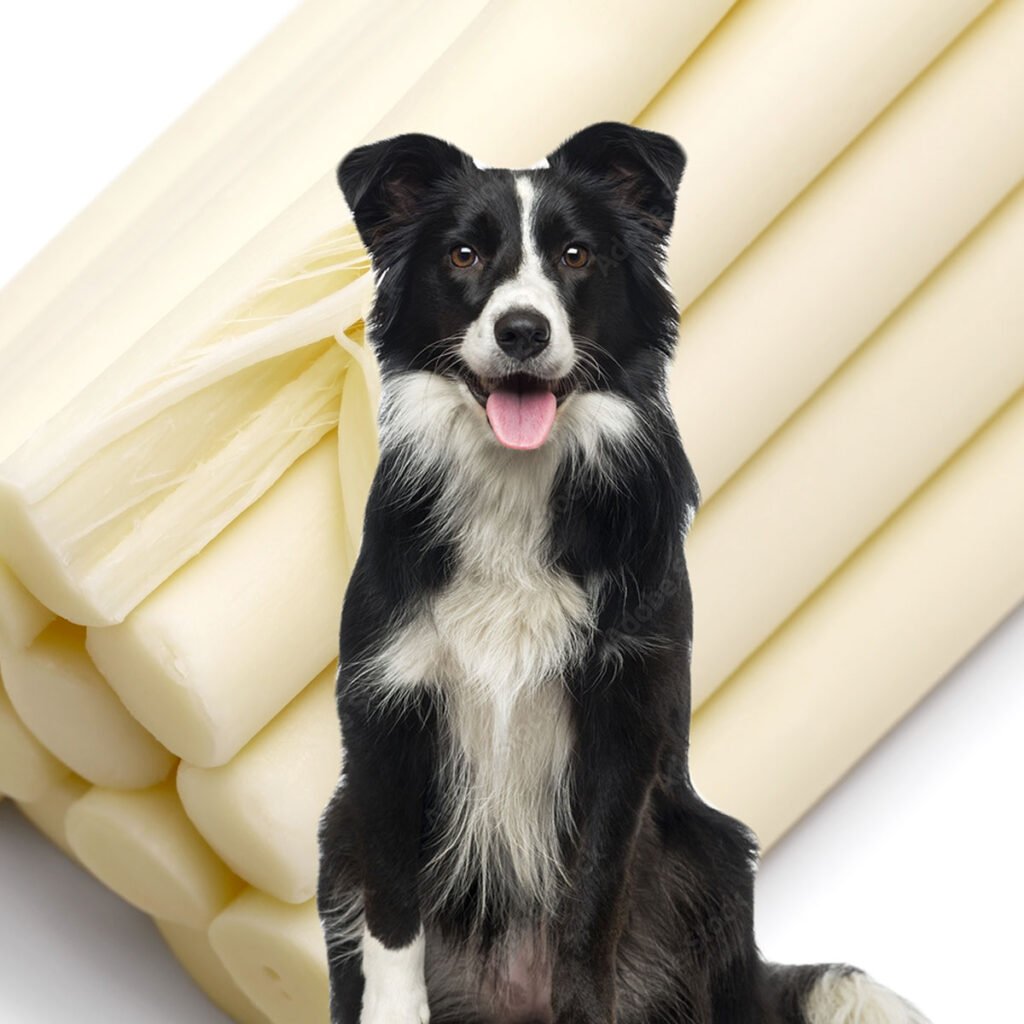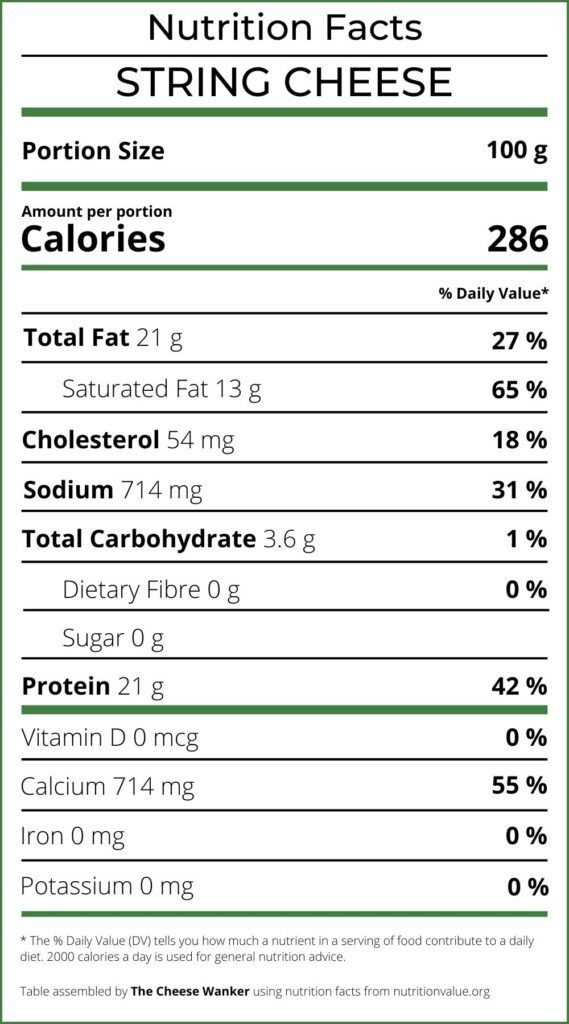String cheese is a popular snack for many people, especially children. It is easy to peel, fun to eat and has a mild flavor. But can dogs safely consume string cheese as well? The answer is not so simple, as there are different factors to consider before giving your furry friend a bite of this cheesy treat.
Table of Contents
In this guide, we will cover everything from the basics to the advanced tips on feeding string cheese to dogs, ensuring that you have the ultimate resource for this topic.
Can Dogs Safely Consume String Cheese?

The first question that comes to mind is whether dogs can eat string cheese at all. The short answer is yes, dogs can eat string cheese in small amounts and occasionally, as long as they are not allergic or intolerant to dairy products.
String cheese is made from mozzarella cheese, which is one of the lowest-lactose cheeses available. Lactose is a type of sugar found in milk and dairy products, which some dogs may have trouble digesting.
However, most dogs can tolerate a small amount of lactose without any problems.
String cheese also has some benefits for dogs’ health, such as:
- Protein: String cheese is a good source of protein, which is essential for dogs’ muscle growth and repair, as well as their immune system and overall health.
- Calcium: String cheese is rich in calcium, which is important for dogs’ bone and teeth health, as well as their nerve and muscle function.
- Vitamin A: String cheese contains vitamin A, which is good for dogs’ vision, skin, and coat health, as well as their immune system and reproduction.
Potential Risks of Feeding String Cheese to Dogs

While string cheese can be a tasty treat for dogs, it also comes with some potential risks that you should be aware of before giving it to your pup. Some of the possible issues are:
- Lactose intolerance: As mentioned earlier, some dogs may be lactose intolerant, meaning that they cannot digest lactose properly. This can cause symptoms such as diarrhea, vomiting, gas, bloating, and abdominal pain. If your dog shows any signs of lactose intolerance after eating string cheese, you should stop giving it to them and consult your vet.
- High sodium content: String cheese is high in sodium, which can be harmful for dogs in large amounts. Too much sodium can cause dehydration, increased thirst and urination, high blood pressure, and even kidney damage. You should always check the sodium content of the string cheese you buy and limit the amount you give to your dog. A general rule of thumb is to not exceed 10% of your dog’s daily sodium intake, which is about 100 mg for a 10-pound dog.
- Obesity and pancreatitis: String cheese is also high in fat and calories, which can contribute to obesity and pancreatitis in dogs. Obesity in dogs is a serious health problem that can lead to diabetes, arthritis, heart disease, and other complications. Pancreatitis is a condition where the pancreas becomes inflamed and produces too much digestive enzymes, which can damage the organ and cause severe pain, vomiting, diarrhea, and loss of appetite. You should avoid giving string cheese to dogs that are overweight, prone to pancreatitis, or have a history of these conditions.
The key to feeding string cheese to dogs safely is moderation. You should only give string cheese to your dog as an occasional treat, not as a regular part of their diet. You should also monitor your dog’s reaction to string cheese and stop giving it to them if you notice any negative effects.
Nutritional Profile of String Cheese for Canine Diet

To give you a better idea of how string cheese fits into your dog’s diet, here is a nutritional profile of a typical stick of string cheese (28 grams):
- Calories: 80
- Protein: 7 grams
- Fat: 6 grams
- Carbohydrates: 1 gram
- Sodium: 200 mg
- Calcium: 200 mg
- Vitamin A: 6% of the daily value
As you can see, string cheese is high in protein, calcium, and vitamin A, but also high in fat, calories, and sodium. Therefore, you should only give string cheese to your dog in small amounts and occasionally, as a treat or a reward.
You should also balance it out with other healthy foods that are low in fat, calories, and sodium, such as lean meats, fruits, and vegetables.
How Much String Cheese Can My Dog Safely Eat?
According to some sources, dogs can eat string cheese in small amounts and occasionally, as long as they are not allergic or intolerant to dairy products. However, string cheese is high in fat, calories, and sodium, which can cause health problems for dogs if consumed too often or in large amounts.
A general rule of thumb is to not exceed 10% of your dog’s daily calorie intake with treats, which is about 100 mg of sodium for a 10-pound dog.
American Kennel club
If a stick of string cheese contains 80 calories (check the label on your brand of string cheese to get a precise calorie count), your dog can safely have a little less than two sticks per day, if they have no other treats.
However, you should always consult your vet before making any changes to your dog’s diet, including the introduction of string cheese as a treat option. You should also monitor your dog’s reaction to string cheese and stop giving it to them if you notice any negative effects.
Introducing String Cheese to Your Dog’s Meals
If you decide to give string cheese to your dog, you should do it gradually and carefully. Here are some tips for introducing string cheese to your dog’s meals:
- Start with a small piece: You should start with a small piece of string cheese, about the size of your fingernail, and see how your dog reacts to it. If your dog likes it and does not show any signs of discomfort, you can gradually increase the amount and frequency of string cheese you give to them.
- Mix it with their food: You can also mix string cheese with your dog’s regular food, such as kibble or wet food, to make it more appealing and nutritious. You can either shred the string cheese and sprinkle it over their food, or cut it into small pieces and mix it with their food. This can also help prevent your dog from gulping down the string cheese too fast, which can cause choking or digestive issues.
- Monitor their reaction: You should always monitor your dog’s reaction to string cheese, both during and after eating it. You should look for any signs of lactose intolerance, such as diarrhea, vomiting, gas, bloating, and abdominal pain. You should also check their weight, blood pressure, and kidney function regularly, as string cheese can affect these parameters. If you notice any negative effects, you should stop giving string cheese to your dog and consult your vet.
Better Alternatives to String Cheese as Dog Treats
While string cheese can be a delicious treat for dogs, it is not the best option for their health and well-being. There are many better alternatives to string cheese that are still enjoyable for dogs as treats, such as:
- Low-fat cheese: If your dog loves cheese, you can opt for low-fat cheese instead of string cheese, as it has less fat, calories, and sodium. Some examples of low-fat cheese are cottage cheese, ricotta cheese, and low-fat mozzarella cheese. You should still give low-fat cheese to your dog in moderation, as it still contains lactose and can cause issues for some dogs.
- Plain yogurt: Plain yogurt is another dairy product that can be a good treat for dogs, as it has probiotics that can benefit their digestive health. Plain yogurt is also low in lactose, fat, and calories, and high in protein and calcium. You should only give plain yogurt to your dog, not flavored or sweetened yogurt, as they can contain artificial ingredients that can be harmful for dogs. You can also add some fruits or vegetables to plain yogurt to make it more tasty and nutritious for your dog.
- Peanut butter: Peanut butter is a favorite treat for many dogs, as it has a rich and creamy texture and flavor. Peanut butter is also high in protein, healthy fats, and vitamin E, which can support your dog’s health and immune system. However, you should only give natural peanut butter to your dog, not regular peanut butter, as it can contain sugar, salt, and other additives that can be bad for dogs. You should also check the label for xylitol, a sugar substitute that can be toxic for dogs. You can give peanut butter to your dog by itself, or use it as a filling for toys or treats.
- Carrots: Carrots are a great treat for dogs, as they are crunchy, sweet, and low in calories. Carrots are also high in fiber, beta-carotene, and vitamin A, which can benefit your dog’s digestive, eye, and skin health. You can give raw or cooked carrots to your dog, either whole or chopped, depending on their size and preference. You can also freeze carrots to make them more refreshing and soothing for your dog’s gums.
Conclusion
String cheese can be a fun and tasty treat for dogs, but it also comes with some potential risks and drawbacks. You should only give string cheese to your dog in small amounts and occasionally, and monitor their reaction to it. You should also consult your vet before making any changes to your dog’s diet, including the introduction of string cheese as a treat option.
There are many better alternatives to string cheese that are healthier and safer for your dog, such as low-fat cheese, plain yogurt, peanut butter, and carrots. You should always choose the best treats for your dog that suit their needs and preferences, and make them happy and healthy.

